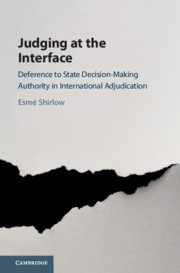Book contents
- Judging at the Interface
- Judging at the Interface
- Copyright page
- Dedication
- Contents
- Figures
- Tables
- Foreword by Judge James Crawford
- Acknowledgements
- Table of Cases
- Table of Treaties, Resolutions, and Declarations
- Abbreviations
- Introduction Deference and the International Adjudication of Private Property Disputes
- Part I Conceptual Framework and Methodological Approach
- Part II Deference in the International Adjudication of Private Property Disputes
- 4 Structures of Deference in International Adjudication
- 5 Conclusive Decision-Making Authority: Deference as Submission or Control
- 6 Suspensive Decision-Making Authority: Deference as Deferral and Abstention
- 7 Concurrent Decision-Making Authority: Deference as Restraint, Reference, and Respect
- Part III The Systemic Role of Deference in International Law
- Appendix Data Tables
- References
- Index
6 - Suspensive Decision-Making Authority: Deference as Deferral and Abstention
from Part II - Deference in the International Adjudication of Private Property Disputes
Published online by Cambridge University Press: 24 February 2021
- Judging at the Interface
- Judging at the Interface
- Copyright page
- Dedication
- Contents
- Figures
- Tables
- Foreword by Judge James Crawford
- Acknowledgements
- Table of Cases
- Table of Treaties, Resolutions, and Declarations
- Abbreviations
- Introduction Deference and the International Adjudication of Private Property Disputes
- Part I Conceptual Framework and Methodological Approach
- Part II Deference in the International Adjudication of Private Property Disputes
- 4 Structures of Deference in International Adjudication
- 5 Conclusive Decision-Making Authority: Deference as Submission or Control
- 6 Suspensive Decision-Making Authority: Deference as Deferral and Abstention
- 7 Concurrent Decision-Making Authority: Deference as Restraint, Reference, and Respect
- Part III The Systemic Role of Deference in International Law
- Appendix Data Tables
- References
- Index
Summary
Rather than treating second-order reasons for deference as conclusive, the adjudicator could instead treat them as suspensive. Adjudicators adopt a suspensive view of domestic authority in the modes of deferral and abstention. Adjudicators adopting this view of authority refer to second order reasons for deference to justify not engaging with certain matters for a period of time (deferral) or at all (abstention). In both modes, domestic decisions are not endorsed. The adjudicator instead declines to exercise its own decision making authority in favour of the exercise of domestic decision-making authority. This is a form of ‘passive’ judicial participation. In these modes, deference is displayed by the adjudicator refraining from exercising its decision-making authority in preference to the decision-making authority of a domestic actor. The adjudicator does by declining to determine a dispute, or a particular matter in dispute, until a domestic decision maker has had an opportunity to make a decision relevant to the case (deferral) or at all (abstention).
Keywords
Information
- Type
- Chapter
- Information
- Judging at the InterfaceDeference to State Decision-Making Authority in International Adjudication, pp. 129 - 152Publisher: Cambridge University PressPrint publication year: 2021
